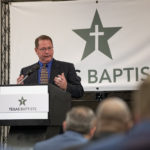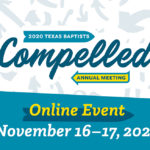Serving as a visiting distinguished professor of history at Baylor University multiple times the past two decades has allowed David Bebbington to indulge what he calls his “hobby.”
He likes to visit churches and take careful notes on what he observes—“from ladies’ hats to prominent heresies” and “from the length of sermons to the choice of hymns.”
“Some people may take a few notes on the sermon. I think it’s important to keep a full record of what goes on in public worship,” said Bebbington, emeritus professor of history at the University of Stirling in Scotland and nonresident director of the Evangelical Studies Program at the Baylor Institute for Studies of Religion.
Visited 47 Baptist churches in Waco area
In addition to assorted Church of Christ, Methodist and other congregations in Central Texas, he has visited 47 Waco-area Baptist churches and recorded his impressions.
His visits have taken him to Primitive Baptist, Independent Baptist and Landmark Baptist congregations.
“At the Landmark Baptist Church, I actually liked being excluded from communion there. They view the Lord’s Supper as a church ordinance in the most distinct sense, limiting it to members of that local church. I respect the way they believe in their principles and stick to them,” he said.
Ministers have been understanding of Bebbington’s observation and note-taking in their worship services, he said.
He particularly noted the pastor of the Landmark Baptist Church made a point to let him know it’s not enough to have an academic interest in religion; a personal commitment to Christ is necessary.
“He took pains to inquire about my spiritual welfare,” Bebbington said. “I appreciated that.”
Sign up for our weekly edition and get all our headlines in your inbox on Thursdays
While Bebbington might have expected a note-taking white visitor to raise a few eyebrows in African American congregations, he said: “I’ve never detected any trace of suspicion. On the contrary, I’ve been met with a generosity of spirit.”
Bebbington lamented the continuing presence of nearly all-white and all-Black churches in Texas.
“I’ve not heard another race denigrated at a church I have visited, but I have observed a neglect and lack of concern for other races,” he said.
Variety among Texas Baptist churches noted
Most of the churches where he has been a guest are affiliated with Waco Regional Baptist Association, and even within Texas Baptist and Southern Baptist congregations, he observes diversity.
“I really like the variety,” Bebbington said. “I like being able to trace back where the various strands come from. Some are a long way down the trajectory from where they originated, but they still maintain some distinctive characteristics.”
At least one growing congregation has charismatic tendencies, and several use contemporary Christian music into worship services, he noted. However, others remain quite traditional, and a few incorporate elements of liturgical worship.
In the course of two decades, Bebbington has recorded how Central Texas Baptist congregations differ from Baptist churches in England and Scotland. He also has observed how Baptist churches in the Waco area have changed since he began visiting them.
‘Dying out of revivals’

On most Sunday mornings when he and his wife are in Waco, they worship at First Baptist Church. But on any given Sunday evening or when he learns about a weeknight revival service, Bebbington may attend a small African American church in an East Waco neighborhood or a remote country church.
So, he particularly views with regret two trends he has observed—the “dying out of revivals” and the discontinuance of Sunday evening worship services in many churches.
One characteristic Bebbington observed that sets Central Texas Baptist churches apart from Baptists in Great Britain is the “paucity of intercession” in worship services.
Typically, Baptist congregations in England and Scotland not only include prayers of intercession for their own members, but also for the larger body of Christ.
“That is neglected here, and it’s not a mark of churches just on the right or on the left,” he noted.
Bebbington views some ‘odd’ sights
Bebbington also pointed out worshippers at Baptist churches in England—like their Anglican brothers and sisters—“linger for personal prayer” at the conclusion of a worship service.
“I find the sudden rush to leave here and the chatter that follows the benediction very odd,” he said.
Another characteristic of most churches he has visited in the Waco area Bebbington considers “odd” is the presence of an American flag and a Christian flag at the front of the sanctuary.
“Churches here profess a commitment to the separation of church and state, but this reflects a merging of church and state,” he said.
He particularly finds troubling the image of a national flag and a symbol of Christianity at the same level.
“Love for one’s country is appropriate, but our superior allegiance is to Jesus,” he said.
What about the ordinances?
Bebbington also noted significant differences in the way Baptists in the Waco area observe the ordinances—or, as he prefers, “sacraments”—of the church, compared to Baptists in the United Kingdom.
“Baptisms here are extremely brief” and often seem rushed, he observed. Worship services in British Baptist churches often build to a baptism as their climax, Bebbington noted.
“Baptism is a powerful visual symbol, and it can be a powerful emotional experience,” he said.
In contrast, the Texas churches he observed often schedule baptism early in the service—apparently to allow the minister time to change out of his waders before the sermon.
“There are pragmatic reasons, but it can seem almost perfunctory,” he said.
Bebbington also noted with regret most Baptist churches he has observed in Central Texas schedule the Lord’s Supper once a quarter.
“In Scotland, churches nearly always have weekly communion. In England, it’s typically observed twice a month,” he said. “I genuinely feel spiritually impoverished by its absence.”
While he noted the frequency of baptisms in some Texas Baptist churches as a positive characteristic, he offered a word of concern: “The candidates for baptism here are much younger. … I hope it sticks for them, but I’m not so sure.”
Longer sermons in Texas
When it comes to whether members “stick” to a particular congregation, Bebbington has noted the “rise and fall” of several Waco-area congregations in terms of attendance and activity, but he does not discern any particular pattern to explain it.
Sermons at Baptist churches in Central Texas are significantly longer than those in Great Britain, Bebbington observed.
“Most are about a half-hour to 45 minutes. Few are less than 25 minutes. I’ve heard a sermon that lasted an hour,” he said. “By comparison, 17 minutes is the average in southern England.”
Baptists in Central Texas generally stress individualism and the priesthood of every believer rather than the priesthood of all believers and the kinship that knits them together, he observed.
Fitting into the evangelical movement
While not all the congregations would embrace the label, Bebbington would characterize all the Baptist churches he visited as evangelical.
From his historical and theological studies of evangelicalism, he developed what others now refer to as the Bebbington Quadrilateral—four identifying emphases of the evangelical movement: the Bible, the cross, conversion and activism.
Every sermon he has heard at a Baptist church in Texas was biblically based, and preachers demonstrate a strong commitment to the atoning work of Christ on the cross, although they may not articulate a specific theory of atonement, Bebbington said.
Worship services almost always include some sort of call to commitment at the end of the sermon, and that commitment includes putting faith into action, he noted.
“That’s true across the board—from the most traditional congregations to the most broad-minded and progressive churches,” he said.














We seek to connect God’s story and God’s people around the world. To learn more about God’s story, click here.
Send comments and feedback to Eric Black, our editor. For comments to be published, please specify “letter to the editor.” Maximum length for publication is 300 words.